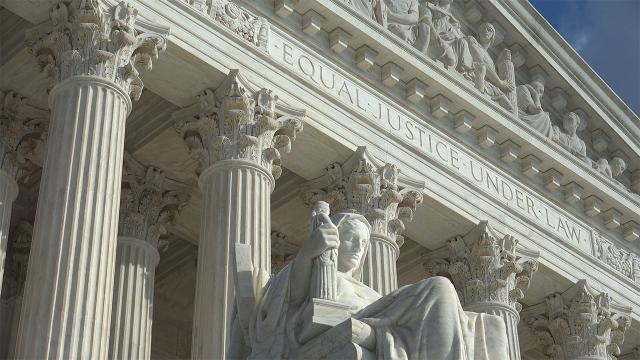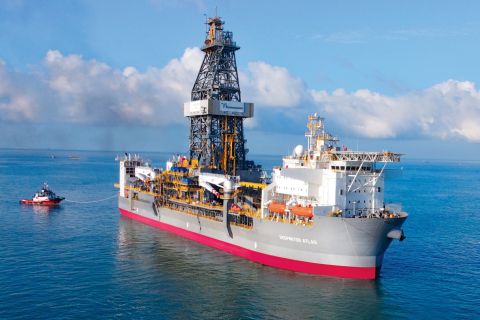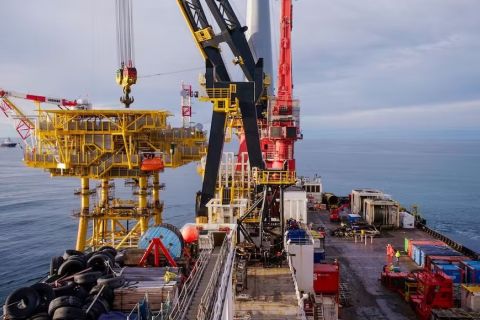
Entrance to the U.S. Supreme Court building in Washington, D.C. (Source: Shutterstock)
WASHINGTON—The U.S. Supreme Court on Feb. 24 appeared poised to rule against environmental groups and find that the federal government had authority to grant approval for a proposed $7.5 billion natural gas pipeline to cross under the popular Appalachian Trail in rural Virginia.
The nine justices heard a one-hour argument in appeals by Dominion Energy Inc. and President Donald Trump’s administration of a lower court ruling that halted construction of the 600-mile Atlantic Coast Pipeline, which would run from West Virginia to North Carolina.
Environmental groups including the Sierra Club and Southern Environmental Law Center had sued to stop the pipeline after the U.S. Forest Service gave the green light for the project through the George Washington National Forest. Dominion Energy leads a consortium of companies in the project that also includes Duke Energy Corp.
Questions asked by several justices suggested the court will overturn the Richmond-based 4th U.S. Circuit Court of Appeals, which found in 2018 that the Forest Service lacked the authority to grant a right of way for the pipeline where it crosses the Appalachian Trail in the national forest land. The proposed pipeline would be 600 feet below a section of the 2,200-mile trail, which stretches from Maine to Georgia.
A ruling is due by the end of June.
Four of the court’s conservative justices asked questions indicating sympathy for Dominion’s arguments, as did liberal Justice Stephen Breyer.
“It really does erect an impermeable barrier to any pipeline from the area where ... those resources are located and to the area east of it where there’s more of a need for them,” said conservative Chief Justice John Roberts, echoing arguments made by the pipeline’s lawyers.
Roberts said that “it doesn’t strike me as that unusual a concept” for National Park Service authority over to the trail to be viewed as akin to an easement across private land, as opposed to federal ownership over national parks, where all development is barred.
Breyer said the possibility of a barrier being created was what was “worrying me most.” He and others questioned whether Congress would have placed tight restrictions on pipelines crossing under the trail without explicitly saying so.
Conservative Justice Brett Kavanaugh said the arguments being made by the environment groups would have “significant consequences” if endorsed by the court.
Conservatives Samuel Alito and Neil Gorsuch also appeared inclined to back Dominion. The other three liberal justices—Ruth Bader Ginsburg, Sonia Sotomayor and Elena Kagan—seemed more sympathetic to the environmental groups.
Mineral Leasing Act
After a lengthy application process involving multiple federal agencies, the Forest Service granted the consortium a right of way under the trail in 2018.
The appeals court ruled that the Forest Service did not have the power to grant a right of way under a federal law called the Mineral Leasing Act. The court cited a section of the law that says federal agencies can grant rights of way for pipelines on “federal lands” but specifically excludes land that is part of the federal National Park system like the Appalachian Trail.
The Trump administration disputed that interpretation, with Solicitor General Noel Francisco saying in court filings that the National Park Service has only limited authority to maintain the trail and that the Forest Service has the authority to approve rights of way across it.
Lawyers for the pipeline consortium noted that more than 50 pipelines already cross under the trail.
The companies have the support of 18 mostly Republican-led states, including West Virginia. The state of Virginia, which is led by Democrats, supports the environmental groups.
The environmental groups have said the project could go ahead under a different route that does not cross the trail on federal land. State and private landowners have the authority to grant rights of way under the trail, the groups added.
Even if the pipeline consortium wins the case, construction would not resume immediately because other legal issues raised by environmental groups are still being reviewed by the federal government.
The Supreme Court’s ruling will also affect the proposed 300-mile Mountain Valley Pipeline, which would run from West Virginia to southern Virginia and crosses the trail in the Jefferson National Forest. The pipeline is almost finished but construction was halted as a result of the ruling in the Atlantic Coast pipeline case before the crossing under the trail was completed.
Recommended Reading
Valaris Updates Fleet Status
2024-02-19 - The backlog of these contracts and extensions is valued at $1.2 billion.
E&P Highlights: Feb. 5, 2024
2024-02-05 - Here’s a roundup of the latest E&P headlines, including an update on Enauta’s Atlanta Phase 1 project.
Rystad: More Deepwater Wells to be Drilled in 2024
2024-02-29 - Upstream majors dive into deeper and frontier waters while exploration budgets for 2024 remain flat.
E&P Highlights: March 15, 2024
2024-03-15 - Here’s a roundup of the latest E&P headlines, including a new discovery and offshore contract awards.
TotalEnergies Fénix Platform Installed Offshore Argentina
2024-02-13 - First gas from the TotalEnergies-operated project is expected in fourth-quarter 2024.





